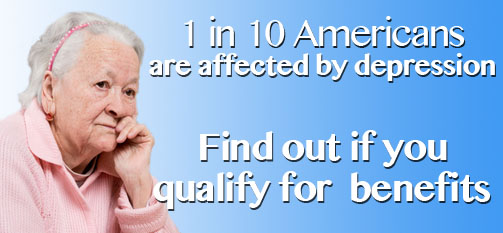Everyone has bad days and all of us have gone through periods of feeling “down”. Maybe even a bit hopeless at times. Those who suffer from clinical Depression, however, experience these feelings constantly. They lose their zest for life. Their interest in hobbies and enjoyable activities begins to deteriorate. Relationships can suffer and, in many cases, the Depression can become almost crippling. It is no surprise that those who suffer from severe clinical Depression are often unable to work. After all, if it is nearly impossible to muster up the motivation to get out of bed, how can someone be expected to manage the daily responsibilities of a full-time job? The resulting financial stress only adds to the Depression, creating a vicious, never-ending cycle. In some cases, Social Security Disability benefits can help those who are suffering from severe Depression. If you are wondering how Depression affects a person's eligibility for Social Security Disability benefits and how the disability application process works, the following information can help.
Depression - Condition and Symptoms
It is not uncommon for people to go through phases of Depression or to become “down” every once in a while. Those who suffer from clinical Depression, however, experience intense bouts of Depression that last days, weeks, months, or even years. The specific symptoms of Depression will vary on a case-to-case basis. Oftentimes individuals who suffer from clinical Depression lose interest in activities and may even begin to avoid family and friends. Other common symptoms of Depression include a feeling of hopelessness, low self esteem, disturbed sleeping patterns, fatigue, decreased energy, difficulty concentrating and even, in severe cases, thoughts of suicide.
For most people, episodes of Depression will resolve themselves within a few days or a few weeks. However, when a person is suffering from severe clinical Depression, the symptoms may continue for months or even years. It is not uncommon for the symptoms of Depression to become worse over time if left untreated. This is why it is very important for those who are diagnosed with clinical Depression to follow the treatment that is prescribed to them by their doctor.
There is no specific test for clinical Depression, although questionnaires can be used to help diagnose the condition. A doctor will usually perform a physical exam and complete medical history to rule out other conditions or illnesses that may be causing the symptoms of Depression. The Diagnostic and Statistical Manual of Mental Disorders is often used to help diagnose a case of clinical Depression.
Once a diagnosis of clinical Depression has been made, it is important that the diagnosed individual adhere to any and all prescribed treatment. Left untreated, the Depression may grow worse over time. While there is no cure for Depression, psychotherapy and prescription medications can help alleviate the symptoms of the condition. It is important to remember, however, that these treatments do not work overnight and it may take weeks or even months for an individual to benefit from treatment (if they respond at all).
Filing for Social Security Disability with Depression
Filing for Social Security Disability benefits based on a case of clinical Depression may be challenging. This is largely due to the fact that Depression is, for the most part, a subjective condition. This is further complicated by the fact that the Social Security Administration (SSA) does not have a specific listing for clinical Depression in its listing of impairments (also known as the “Blue Book”). That does not mean, however, that it is impossible to qualify for Social Security Disability benefits based on a case of clinical Depression.
Clinical Depression is covered in the Blue Book guidelines under Section 12.04, which covers Affective Disorders. While Depression is not specifically covered in the Blue Book under its own listing, you may be approved for Social Security Disability benefits under Section 12.04 if your Depression results in limitations of your daily activities and/or social functioning or you suffer from a loss of interest in most activities, have suffered significant changes in eating habits and weight, have disturbed sleep patterns, decreased energy, paranoid thinking and/or suicidal tendencies.
Depression and Your Social Security Disability Case
Because there is no specific listing for Depression in the Social Security Blue Book, it can be challenging and complicated to qualify for Social Security Disability benefits. That does not mean, however, that you cannot qualify for Social Security Disability benefits due to a case of clinical Depression. You will just need to work a little harder to prove your disability to the SSA.
Chances are that you may have to file an appeal in order to receive the Social Security Disability benefits you are entitled to. Approximately 70 percent of initial applications are denied by the SSA. If you are looking to file for disability benefits or have already been denied, you should consider hiring a Social Security Disability lawyer to represent you. Your chances of filing a successful disability claim are increased with proper legal representation.
